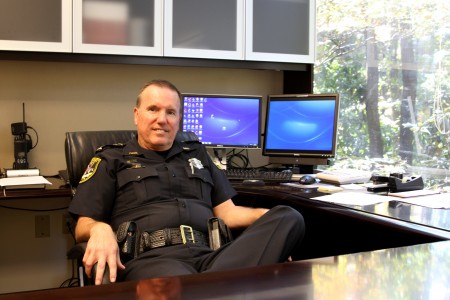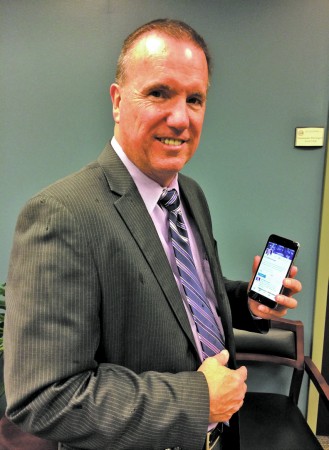
Dunwoody Police Chief Billy Grogan employs social media to extend the reach of the long arm of the law.
“We started out using Twitter from Day One and quickly added Facebook and YouTube,” Grogan said.
As more police departments are recognizing the value of social media – the Atlanta, Dunwoody, Sandy Springs and Brookhaven departments all have Facebook and Twitter accounts – Grogan is becoming recognized as a local expert on the subject by blogging, training officers on social media use and by publishing a book, “How to Use Twitter: A Guide for Law Enforcement,” in July.
Brookhaven Police Officer Carlos Nino said Grogan visited that city in August to train about 20 officers in social media best practices for two hours. Those officers now follow Grogan’s “system,” Nino said.
“We have mirrored Dunwoody’s use of social media.”
Nino said transparency was the biggest takeaway from Grogan’s teaching.
“We want to be as transparent as possible, especially during unique/difficult situations that we may encounter in our community,” Nino said.
Brookhaven recently added a Spanish Facebook page, and the Atlanta Police Department recently announced its use of Periscope, an application that allows police to live stream special events. The department later adds the video to its YouTube channel at youtube.com/user/AtlantaPoliceDpt.
“We want to make sure that our citizens have multiple opportunities to engage with us,” Chief George Turner said in a press release. “Social media is an ideal platform to increase our community outreach and share how Atlanta officers are fighting crime.”
Grogan said his interest in social media, coupled with his expertise in law enforcement’s use of social media, led him to believe he could write his new book. Some colleagues encouraged him, Grogan said, and when he searched on Amazon he said he didn’t find much in the way of educational books about social media for law enforcement.
“I read an article not too long ago that said something like 80 percent of the people in the United States want to write a book, but only 1 percent ever will, and so that was kind of why I did it,” he said. “It’s not the only book I plan to write.”
A colleague who met Grogan more than a decade ago bought Grogan’s “How to Use Twitter: A Guide for Law Enforcement” on Amazon shortly after it published in July. Kennesaw Police Chief Bill Westenberger said he and Grogan worked together in “many ways over the years.”
“He cares deeply about the community and always looks for ways to best serve,” Westenberger said. “He has made several presentations at seminars and panels on the topic [of social media].”
Westenberger said Kennesaw police found Grogan’s book on Twitter beneficial, and believes other agencies would, too.
“We wish the book would have been around when we began using Twitter,” he said. “We could have saved a great deal of time and energy by having the book and learning best practices.”
Dunwoody City Councilman John Heneghan began his blog as a “sounding board” for local issues more than 15 years ago, he said. Heneghan said social media as a mass communication tool for police has “far surpassed the days of a wanted poster at the local post office.”
Grogan and officers who use the police department’s social media platforms have cultivated a following among Dunwoody residents and beyond, Heneghan said. The police can “inform, warn or laugh at the realities of today’s existence,” he said.
Grogan said he’s always looked at social media as an extension of community policing. Citizen police academies, ride-alongs and community meetings could only ever reach so many people, Grogan said, and reaching the wider community takes more effort.
“Social media actually kind of evens the playing field and makes what we’re doing available to everybody,” Grogan said.
The International Association of Chiefs of Police encouraged Grogan to write a social media blog in 2011, which he did monthly during the year.
“I still [blog] today, but I don’t have to blog as often because now they have more people doing it,” he said.
Grogan said in addition to blogging he also speaks publicly on social media as a professional courtesy.
“The majority of time that I speak about social media, it’s at conferences that I’m already attending,” Grogan said, such as at conferences for the Georgia Association of Chiefs of Police and the International Association of Chiefs of Police.

“I’ve always been interested in technology and had been reading about social media,” Grogan said. “I think I might have had a MySpace account at one time.”
Twitter was barely a year old when Dunwoody incorporated in 2008, but Grogan said he had been tuned into the Internet throughout his career.
He said he started to focus on learning about social media when he got to Dunwoody. The chief said he knew social media would allow the officers to learn about and connect with their community.
“It takes time to develop that relationship with your community. I started looking around and realized that a lot of people in our community are online, on the Internet, they’re blogging and very savvy, social media wise,” Grogan said.
